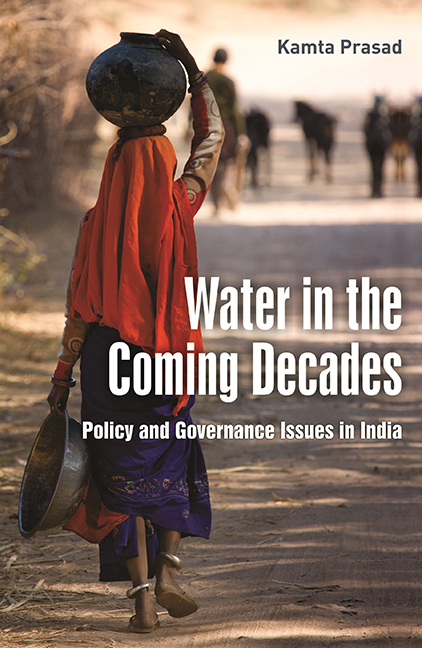Book contents
- Frontmatter
- Dedication
- Contents
- List of Tables
- List of Abbreviations
- Preface
- Acknowledgements
- Section I Overall Perspectives
- Section II Situational Analysis
- Section III Socio-economic, Institutional and Environmental Aspects
- Section IV Technological Options
- Section V Concluding Observations
- References
- Index
12 - Institutional Framework for Resolution of Interstate Water Disputes
Published online by Cambridge University Press: 13 July 2022
- Frontmatter
- Dedication
- Contents
- List of Tables
- List of Abbreviations
- Preface
- Acknowledgements
- Section I Overall Perspectives
- Section II Situational Analysis
- Section III Socio-economic, Institutional and Environmental Aspects
- Section IV Technological Options
- Section V Concluding Observations
- References
- Index
Summary
Interstate water disputes have been a prominent feature of the water resource scenario in India. These disputes or conflicts pertain mainly to sharing of water in rivers which are common to more than one state. The present chapter examines the dimensions, causes and effects of the disputes, institutional measures taken so far for their resolution and suggestions offered to deal with them in future. Laws related to interstate water disputes are, however, analysed in Chapter 20.
Introduction
Conflicts among states with respect to utilization of water of rivers flowing across their boundaries have become quite frequent. These conflicts, sometimes, acquire political overtones, which tend to generate an emotionally surcharged atmosphere as has been noticed in recent years, especially in Karnataka and Tamil Nadu with respect to the Cauvery river and in Punjab and Haryana with respect to the Sutlej Link canal. Such situations receive media attention to such an extent that one gets an impression as if management of water resources in India is concerned essentially with management of conflicts between states over water of common rivers.
Several disputes have been resolved by negotiations and agreements among the concerned states, with or without the central government's intervention. Some have been resolved through the mechanism of tribunals set up for the purpose. But, there are disputes which could not be resolved through either of these as for example the Cauvery river water dispute between Karnataka and Tamil Nadu, the Sutlej Links canal dispute between Punjab and Haryana, disputes regarding the Indrāvati Project between Odisha and Chhattisgarh, the Ujjain Project between Maharashtra and Karnataka, and the Almatti Dam between Karnataka and Andhra Pradesh, the dispute between Delhi and Haryana with regard to Yamuna, between Tamil Nadu and Kerala with regard to Mullaiperiyar dam of Param-bikulam-Aliyar (PAP) project. Besides, there are several minor disputes like those between (i) Bihar and Uttar Pradesh regarding timely release of water for irrigation in Sone canal system through Inderpuri Barrage, (ii) Andhra Pradesh and Chhattisgarh regarding the height of dams of Polavaram and Inchcupalli projects, (iii) Punjab and Haryana with respect to Yamuna waters, (iv) Maharashtra and Andhra Pradesh on construction of Babhali Barrage on Godavari by Maharashtra, (v) Andhra Pradesh and Karnataka on construction of Paragodu Project on Pennar river by Karnataka, (vi) Andhra Pradesh and Odisha relating to Vamsadhara river project.
- Type
- Chapter
- Information
- Publisher: Foundation BooksPrint publication year: 2014



